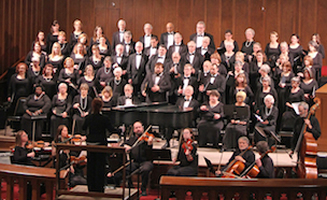For some reason, vocal recitals never draw much of a crowd in the Triangle. While we clamor for more opera – while letting local companies die of neglect – the art song seems to be a rarified taste. And so, it was to a small audience that soprano Heidi Grant Murphy sang at Fletcher Opera Theater as the first course of the 2003 Great Artists series. Everyone who didn’t attend missed a lovely performance and one that could well have made some converts.
The art song is a mini-drama, a brief glimpse of an emotion, another person, an event, even a landscape. In a few moments, the singer must capture and convey to the audience the essence of the text. To make the art song work, a singer must be more than just a musician, he or she must also be a consummate actor in order to fully bring to life the meaning and imagery of the combination of text and music. If we had to highlight any single trait in Murphy’s performance it is the conviction with which she sings. By completely immersing herself in a song, the accompanying gestures and body language, as well as the music and diction come through as authentic and natural. No folded hands, or stiff posing for this young singer.
Murphy has a lovely light lyric voice, the kind that composers most frequently cast in comedy as ingénues, servants and pages. Her program was appropriately suited to her smaller voice, including works of charm, wit and, of course, love. Yet while she certainly has what is known in the trade as a “small” voice, there is clearly a lot of power behind it. Her pianissimos resonated through the hall.
Accompanying a singer is a delicate balancing act, and it helps if you are intimately familiar with the singer’s voice. Murphy’s accompanist is her husband, Kevin Murphy, an associate conductor at the Met. He consistently kept the piano, even with a fully raised lid, in perfect balance with Heidi’s voice, a factor that added to the elegance of the evening.
The program opened with an unusual collection of little known vocalises by Copland and Prokofiev and a well-known one, “Pastorale” by Stravinsky. That’s a long time to spend on “ah,” but Murphy delivered her syllable as if it were fraught with meaning, creating stories and little dramas without words.
There followed four Lieder by Schubert and three by Richard Strauss. Schubert’s “Liebhaber in allen Gestalten” (Lover in all disguises) is a strophic ditty in which a lover imagines how he would behave to his beloved if he were a bunch of different animals and it allowed Murphy to weave her spell as a comic actress. The final song of the Schubert set, “Rastlose Liebe,” (restless love) was the most stormy and intense song of the evening, demonstrating that Murphy can bring more vocal power to heavier subject matter.
The Strauss set included some of the composer’s more lyric settings, including “Ständchen” (Serenade), “Morgen” (Tomorrow) and “Cécile,” all love songs emphasizing the more idyllic and gentle aspects of the subject. Since Sophie in Der Rosenkavalier is one of Murphy’s specialty roles – in which she will appear this season at the Met – her Strauss performances hinted at the youthful naiveté she probably brings to the role.
The second half of the program was devoted to the works of two minor composers, including five songs by French composer Gabriel Piérné (1863-1937) and three by Catalan composer Fernando Obradors (1897-1945). Unfortunately, whoever was responsible for the program and supplying texts and translations neglected to furnish the texts for both the Schubert Lieder and the Obradors songs. Obradors is sufficiently obscure so that a Grove, Baker and even a Google search revealed only that he had once been the conductor for the Gran Canarias orchestra. This kind of inattention to the details of the presentation as a whole can hamper a program and make it difficult to evaluate a performance.
The Piérné songs were charming, especially “Les marionettes,” but neither text nor music were any great shakes. Like most Iberian composers, the Obradors songs sounded – well – Iberian and Murphy attacked them with an appropriately Hispanic flair.
It is frequently important for singers to go to elaborate lengths to conserve and protect their instruments, but a vocal recital without an encore strikes us as just bad manners, especially in such a short program and with such vigorous applause. While we enjoyed hearing so many unfamiliar works, it was Murphy, rather than the quality of most of the music that was the highlight.
A Postscript: The Fletcher Opera Quilt
Before the concert, Tom McGuire from the A. J. Fletcher Foundation unveiled a specially commissioned quilt that now hangs in the stairway on the left side of the auditorium. The Foundation commissioned the quilt to honor its founder and to celebrate his love for and contribution to opera.
In the center panel of the quilt is a portrait of Fletcher himself dressed as Don Alfonso from Così fan tutte and surrounding panels illustrate scenes from 12 operas, sampling the 50-year history of the Grass Roots Opera Company, AKA the National Opera and now the Fletcher Opera Institute.
The quilt’s creator, Amy Stewart Wilson, spent 540 hours designing and sewing the quilt. It adds a touch of charm and color to an otherwise drab staircase.











